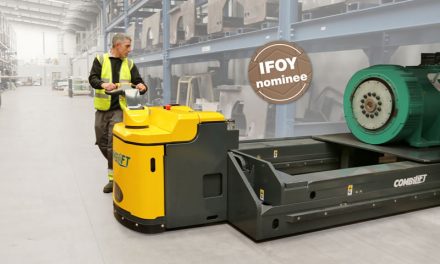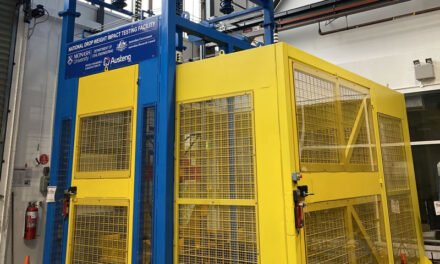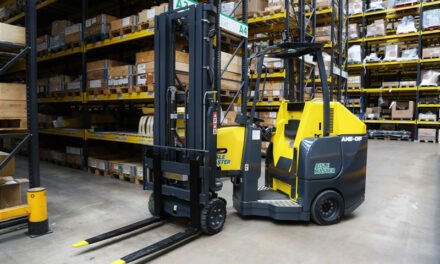
Above: The Meyer Timber office and warehouse teams working in collaboration to fulfil projects in the prefab department.
Meyer Timber’s close connection with its customers starts with a workplace that celebrates, passion, drive, care and mateship. By Donyale Harrison
Next year, Meyer limber turns 50. It’s a milestone no business reaches by accident, only by growing with its customers along the way.
“In the early days, business was about two things,” says Kent Powell, national sales and marketing manager at Meyer Timber. “Good product and good relationships.
“Now it’s about good product, good engineering, good logistics support, aiding our customers into new markets, delivering for them on new opportunities, guaranteeing quality when it comes to certification and assurances, plus so much more – and good relationships!”
Meyer’s secret for success over half a century has been consistent.
“It’s the people,” says Powell. “Our people, from the warehouse floor up to management, and the customers who invite us into their businesses. Without having all of those relationships, you don’t get Meyer Timber.” So how did they build those relationships?

Above: Meyer Timber NSW warehouse and office teams pictured at the company’s Penrith site.
PEOPLE ARE OUR BEST PRODUCT
“It starts before we even hire people,” says Powell. “We have a 20-year relationship with our recruitment company and we take it very seriously. They have great profiles on who will fit best in our various roles, from the warehouse floor to management.”
“Across all those profiles, there are two core qualities: ‘teamwork’ and ‘striving. Sometimes that striving comes from a competitive sports background, sometimes it’s a person who’s really career-focused, sometimes it’s a person who just wants to do their specific thing as well as it can be done.
“Anyone who can combine those two qualities, we want them at Meyer Timber – even if they’ve never worked in the building industry before. We can teach them timber if they have teamwork.”
Looked at through this lens, Meyer Timber is much more than a wholesaler. “We’re not just a sales business,” says Powell. “We’re a solutions business that happens to specialise in wood!
“Selling timber is at our core, but there are many layers to how we sell, including intellectual advice, product development, product knowledge and more. Those are the things that keep us at the front of our customers’ minds when they’re deciding where to buy.”
Meyer’s solutions start with careful listening, whether that’s sales staff identifying service gaps around logistics through customer feedback or from a team member (who may even be the delivery driver), or the technical team talking directly to a builder on site and taking that intelligence back to the correct advice centre at Meyer.
“That happens pretty regularly,” Powell says. “We identify customer desires that are deeply sought after, whether in person or through our customer portal. If they’re design issues, we come back to our detailing team and we get a quick response. Sometimes it’s a bigger issue, like identifying new challenges on a particular style of build where opportunities for a timber solution are possible over steel.
“Our meyBRACE portal frames are a good example: they’ve become very popular in the seven or eight years we’ve been doing them because our engineers can identify projects where they will work and can explain the benefits without the customer needing a high level of engineering understanding – plus that’s one less supplier on the project if you replace steel with timber.”
It’s not a case of simply designing a new product and giving it a pretty web page:
Meyer actively looks for projects on which their new solutions will deliver results.
Powell says, “When our team go out to talk with their customers, they’ll say, ‘Hey, are any of your builders doing this sort of build? Because we can supply this now…’ And our timber merchants and F&T plants can quickly see the opportunities.
“Because we make sure we keep the same sales guys going out to see the same customers year after year, we learn a lot about those customers’ businesses, which is great for both spotting where a new product we have can help them and for learning about gaps they have that can drive our next new solution.
“We don’t optimise who our reps see in terms of regions they cover, we focus on building and keeping those relationships between customers and sales reps. I still fly up to see some of our very first founding Brisbane customers, for example, because he believed in us on Day One and it’s important to keep the original connection. Is that the most economical use of our travel budget? No. Are we going to keep doing it anyway? Yep.”

Above: Meyer Timber’s ‘Builder-go-to’ Charlie Vella providing onsite support.
Where the Meyer team does optimise is in delivery.
“This takes two forms,” says Powell. “The first is around the designs we work on: we’ll look for areas where we can supply more timber and we’ll look for ways we can supply that more efficiently. Say we’ve identified a project for our cassette floors. We’d speak to that customer and say ‘We’re delivering nine cassette floors on 22 October, if you can have nine bottom-storey frames ready by then, we can go straight from delivery to floor install’, so they can do nine floors in one day and decrease the amount of time they need a crane on site.
“Our design team looks out for those sorts of efficiencies and, because we’ve been a reliable partner for those customers over years, they trust our advice in those situations.”
Then there are the more mundane but every bit as vital logistical efficiencies.
“A lot of our material is going out to regional centres, we’re talking about a 500km road bridge to some,” Powell says.
“We work to group delivery to these types of customers in a way that gains a reliable and timely supply offer for them and makes sense for us commercially. Fortunately, those customers are supportive and are cleverly using our diverse range, so together, we tend to be able to put together an attractive delivery offer to the regions.
“It doesn’t always result in a freight cost saving, but it does mean that those regional areas experience a higher delivery frequency, helping them deliver faster service for their customers.”
This consistency of supply benefits metro as well as regional customers. “It can be that one or two sticks of timber are the most important thing someone needs,” says Powell. “If we get an email at two o’clock in the afternoon saying ‘We need two very important beams tomorrow!’, chances are they’ll get those beams, because we’re already going out to them”.
“Even in a softening new home market, the service model promise remains. We’re still seeing demand for a lot of commodity DIY/ renovation consumption items: merbau, treated pine and white-primed pine and panels for renovations and extensions are still in high demand. So our trucking remains intact and ready to roll, and our reps are fast responders! Our customers know that they’ll see their same Meyer Timber truck and driver turn up with seamless regularity.”

Above: A build featuring meySPAN Structural LVL and meyWALL LVL wall framing – plus a load of invisible technical and design advance.
ENGINEERED RESULTS
Meyer’s focus on engineered wood products and high level inhouse engineering services have been at the heart of its differentiation from most other timber wholesalers.
“We’ve long been pioneers in solution-selling engineered wood,” Powell says.
“Australia is quite an educated market – I travel a lot and see what’s happening elsewhere and our customers would be some of the most savvy and educated EWP customers in the world.
“For over a decade, we’ve been investing in that resource from an education point of view, creating opportunities as well as supplying product, because we believe that 80% of the market is buying on more than price. Other major players in the industry have done the same, but that benefits all of us because it increases the number of builds in timber and people’s confidence in the material.”
In 2012, Meyer hired George Dolezal as principal engineer, followed by Afzal Laphir in the same role a few years later. “They both came from Pryda, with George also working at Carter Holt Harvey before he came to us,” says Powell. “We actually hired George to focus on mass timber, and six months into that appointment, we realised the market at our level at that time wasn’t ready for that. So we changed the strategy and put George’s time and effort directly into our truss and frame customers, and it was an overnight success.
“Before long, he’d been such a success in the New South Wales business, we required his equal in Afzal down in Victoria. Having their expertise means we’ve been able to expand our offer to our customers: they can buy their EWP from Meyer, but they can also turn to us for engineered solutions and for engineered products to fit into those solutions.”

Above: meySPAN Structural LVLis a trusted material for builders.
Alongside meyBRACE, Meyer cassette products, particularly floors, have been growing their market share. “We’ve been supplying these into Victoria, New South Wales and Queensland – both regional and metro,” says Powell. “When we did our first cassette line in NSW, it was built with a proof-of-concept mentality. We wanted to bring in fabricator customers and show them what it looks like and how it’s done, and hoped they would take on the job in-house themselves because in our opinion this is the space that they rightly exist in.
“The idea was for us to build and teach and then create a network that the market could draw on. One cassette line can’t feed the market, but many can – plus the Meyer Timber warehouses are built for bulk storage, picking of timber and processing of components.”
That shift to Meyer designing cassettes rather than producing them has been slower than the team envisioned but is underway.
Powell says, “Nationally, there’s a small but growing network of customers who have embraced partnering in cassettes; some in Queensland, a couple in NSW and one or two in Victoria. They’ve taken on the manufacturing themselves, but still use the design and componentry supply from Meyer Timber.”
The number of builders using these cassettes has also grown, with several of the manufacturers now supplying them to multiple customers.
“I think there’s room for growth and change in their model, too,” says Powell. “It could end up even involving install. We all need to be open to change in how the market is supplied or someone will disrupt from the outside. We need to continue to evolve.” One unexpected change that Meyer has embraced is supplying cassette projects into Passivhaus builds.
“We expo-ed at a few Passivhaus conferences and now we’re doing three to six Passivhaus builds in NSW every year,” Powell says. “That’s a fully closed, insulated roof and floor cassette and they’re done to a very specific standard, but I think they are pointing the way.
“The market growth in closed thermal panels will only grow. We may not all want the extreme Passivhaus standards, but we do want to run our houses in an energy-efficient way, so these sorts of high-performance, roofs, floors and walls will continue to be a trend in some form.”
Over the eight years that Meyer has been focusing on cassettes, they’ve seen builders readily understand the benefits of their offsite construction. “There are fewer trades on site, less waste, cleaner sites and fewer phone calls to coordinate delivery,” says Powell.
“We’ve been working with one builder in New South Wales who has a utopian plan to lock a house up with just three phone calls. These are the sorts of visionary builders who can deliver 100, 300, 500 houses towards the country’s 1.2 million goal for solving the housing crisis.
“For all of us it’s a win, because those houses will be storing carbon in their timber products, and for the merchants, frame and truss guys and builders, it means that rather than buying from four or five suppliers – on any one day you could have two or three deliveries coming in – you’re consolidating all of that and building faster and more efficiently.”

Above: The Meyer Timber NSW warehouse team at the Penrith site: the warehouses, sellers and designers work together to deliver the best solutions in optimal time.
MAINTAINING FOCUS ON CUSTOMER NEEDS
Effecting this level of change in the marketplace is only possible for a company that has great relationships. “We spend a lot of time doing due diligence on our product,” Powell says. “A core Meyer Timber supplier would be visited two or three times a year by our buyers and our engineering team, and some more than that.
“On top of that we do third-party auditing and have in-house testing facilities in Sydney and Melbourne. Part of that is being able to hand over documentation that will satisfy any certifier and give assurances as to sustainability, but we also want to make certain that we’re meeting our legal and moral obligations when it comes to avoiding risks of illegal wood.
“The market has had sustainability at the top of its concerns for decades and, since Covid, people are now further understanding the importance of compliance – not least because certifiers on building sites started speaking out when they saw non-compliant material. Now, it’s clear to us that our market’s also going to very quickly become educated around legal procurement of wood.”
New legislation regarding deforestation as well as the greenwashing of timber out of war zones and similar areas have made tracking the origins of raw material in timber products more important than ever. “Policing that is a full-time job that takes up a lot of resource,” says Powell. “But it’s better than the alternative.”
On a happier note, all that effort into product research is often rewarded with attractive additions to the Meyer offer.
“We’re now the national distributor for TimberTech wood composite decking, which is a medium- and high-end wood composite,” Powell says. “It’s a long-lasting product perfect for around pools and outdoor entertaining areas and has a very long guarantee. Even better, it’s mostly made using recycled material!
“Also on a decking note, we’re now selling pre-oiled merbau. This was a funny one because the whole timber supply market had been trying to get pre-oiled product out there on numerous occasions and it just hadn’t broadly stuck. But this time it looks as though the market has done a good job of educating builders around the advantages to buying pre-oiled decking in particular.
“So mills in Australia and Southeast Asia are investing in pre-oiling now and it will probably become the new standard. We’ve got customers now that prefer their merbau decking pre-oiled, whereas 12 months ago, they weren’t buying a stick of oiled merbau decking. The manufacturers have made the price add-on very palatable in our opinion and it will result in in far fewer claims from uneducated end users who decide to not oil their deck for the first six months.”
It’s not the first time Meyer has taken a few goes at a product the team knows to be worthwhile, waiting until the marketplace catches on, and it probably won’t be the last.
“But when we know something will help our customers,” says Powell, “we’ll give it our best shot, even if we get knocked back once or twice. For us, Meyer Timber isn’t about the greatest possible number of sales, it’s about people, products and service. We focus on delivering an experience and a relationship.
“You can see that when it comes to our own marketing: 10% of that is traditional brand marketing and then 90% is figuring out what each and every different type of customer wants from Meyer Timber so our people can deliver the personalised results that are right for each of them.”
For more, visit www.meyertimber.com.au











